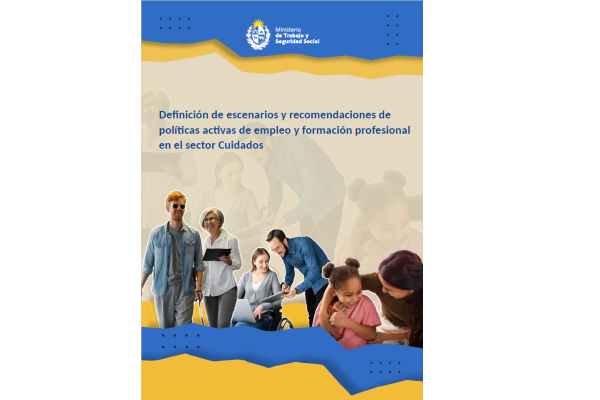
The webinar series *“Professionalizing Care, Transforming the Region”*, coordinated by the ILO/Cinterfor’s Regional Network for Training and Certification in Care, aims to foster dialogue and exchange of best practices across Latin America and the Caribbean. With a collaborative, regional approach, the series explores key topics such as developing shared competency standards, integrating transversal skills in training, addressing labor rights, and promoting gender, mental health, and migrant inclusion. The first session, held on April 29, 2025, focused on identifying regional needs and advancing toward common qualification frameworks in the care sector, featuring insights from Uruguay’s DINAE/MTSS and Mexico’s CONOCER.
Uruguay’s care sector, which supports children under 3 and dependent older adults, plays a vital role in the country’s social and economic fabric. However, it faces serious challenges: high informality, low wages, and significant training gaps among workers. As of 2023, around 55,000 people were employed in the sector, but nearly 40% worked informally and over 21,000 lacked specific training in early childhood care.
Looking ahead to 2033, Uruguay will need over 15,000 trained workers in elder and disability care and more than 16,000 in early childhood care, just to meet moderate service coverage goals. The current pace of training is far too slow to close this gap.
To address this, the country must expand and improve training programs, increase graduation rates, and better align education with real labor market needs. Special focus should be given to improving practical experience, introducing dual learning options, and applying a person-centered care approach.
At the same time, stronger employment policies are needed—such as wage regulation, formalization of domestic care jobs, and better working conditions—to make care work dignified and sustainable.
Investing in the care sector is not only socially just, but economically smart. It could raise women’s employment by nearly 9 percentage points by 2030 and generate more than 133,000 jobs. This is an opportunity Uruguay cannot afford to miss.
Mexico is experiencing a significant demographic shift, with an increasing number of older adults requiring long-term care. Currently, the country lacks a comprehensive national care system, leading to fragmented services and placing a substantial burden on families, particularly women who often serve as unpaid caregivers.
The INGER report highlights that approximately 15% of the 18 million older adults in Mexico need assistance with daily activities. However, the existing care infrastructure is insufficient, and there is a notable absence of standardized training and certification for caregivers.
To address these challenges, the report recommends establishing a National Care System that recognizes care as a fundamental right. Key components should include:
- Governance: Implementing clear policies and coordination mechanisms across federal and local levels.
- Service Provision: Expanding access to home-based care, community centers, and respite services.
- Workforce Development: Formalizing and certifying caregivers to ensure quality care.
- Quality Assurance: Establishing standards and regulations to monitor and improve care services.
Investing in such a system is not only a social imperative but also an economic opportunity. It can create jobs, support gender equity, and ensure that older adults receive dignified and adequate care.
Anastasiia Pavlova took the floor on behalf of ESPU. She emphasized the importance of South-South and triangular cooperation as key frameworks for regional collaboration—sharing knowledge, resources, and strategies among countries in the Global South with support from international partners. She also highlighted the need to professionalize care work, which is often undervalued, informal, and predominantly done by women. The session focused on building shared occupational standards to improve care quality, support labor mobility, and strengthen social protection systems. While challenges remain, such as structural differences and cultural barriers, there is a strong opportunity to create decent jobs, promote gender equity, and drive regional integration. She closed with a call to action: to work collectively toward a more just and inclusive future for both caregivers and those receiving care.

